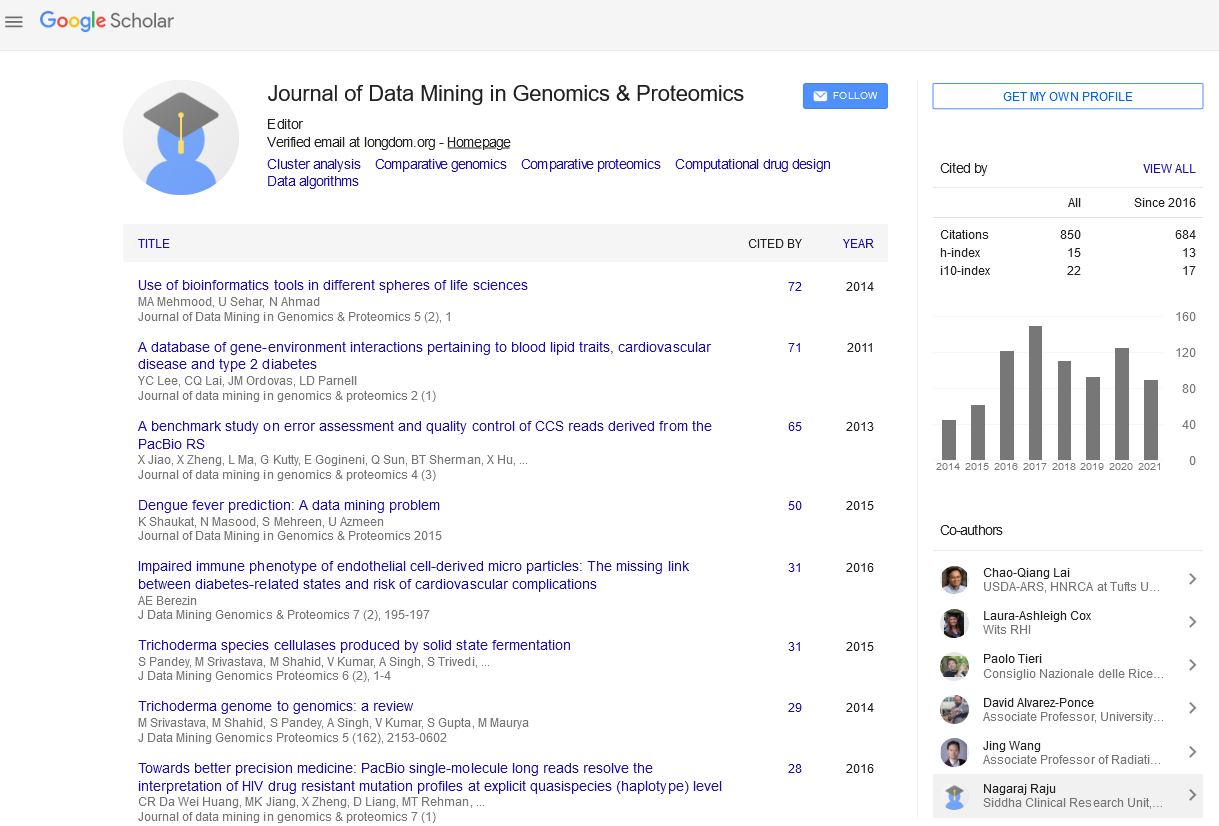PMC/PubMed Indexed Articles
Indexed In
- Academic Journals Database
- Open J Gate
- Genamics JournalSeek
- JournalTOCs
- ResearchBible
- Ulrich's Periodicals Directory
- Electronic Journals Library
- RefSeek
- Hamdard University
- EBSCO A-Z
- OCLC- WorldCat
- Scholarsteer
- SWB online catalog
- Virtual Library of Biology (vifabio)
- Publons
- MIAR
- Geneva Foundation for Medical Education and Research
- Euro Pub
- Google Scholar
Useful Links
Share This Page
Journal Flyer

Open Access Journals
- Agri and Aquaculture
- Biochemistry
- Bioinformatics & Systems Biology
- Business & Management
- Chemistry
- Clinical Sciences
- Engineering
- Food & Nutrition
- General Science
- Genetics & Molecular Biology
- Immunology & Microbiology
- Medical Sciences
- Neuroscience & Psychology
- Nursing & Health Care
- Pharmaceutical Sciences
Human genomics: A framework for education and reduction to practice
2nd International Conference on Big Data Analysis and Data Mining
November 30-December 01, 2015 San Antonio, USA
Corey Nislow
University of British Columbia, Canada
Posters-Accepted Abstracts: J Data Mining Genomics Proteomics
Abstract:
The tempo of next-generation sequencing data acquisition continues to accelerate and the costs of sequencing are decreasing rapidly. The result has been an exponential increase in the amount of data available and new informatics tools are making the information encoded in our genomes more accessible. At the same time, there is growing pressure from an increasingly savvy and interactive public for actionable genomic information. Indeed these two developments have brought us to an inflection pointunless a concerted effort is made to bridge the divide between genomics research and its potential applications, the genomics community risks repeating the let-down that followed the hyperbolic triumphalism that followed the announcement of the first draft of the human genome sequence over a decade ago. We propose an education-first approach to genomics instruction and training, one that considers all aspects of pharmacogenomics, from patient sample collection, through sequencing and analysis, to variant detection and association to actionable practice. The talk will describe our framework for educating the next generation of front-line health care providers pharmacists to demystify and interpret pharmacogenomics in the clinic. This framework already exists for traditional therapies; clinical practice requires the understanding of metabolism and biochemistry, of development and formulation, to inform clients.
Biography :
Corey Nislow completed his Ph.D. from the University of Colorado, and pursued Post-doctoral studies for the American Cancer Society. He spent 6 years in the Biotech Industry in the California Bay Area leading teams dedicated to High-throughput and cell-based assay development. For the past 10 years he has pioneered microarray and next-generation sequencing technologies for drug target identification and epigenetic studies. He is currently the Director of the Sequencing Centre at the UBC Department of Pharmaceutical Sciences. He has published more than 100 papers in high-profile journals, 6 issued patents, serves on several editorial boards and scientific advisory boards.


